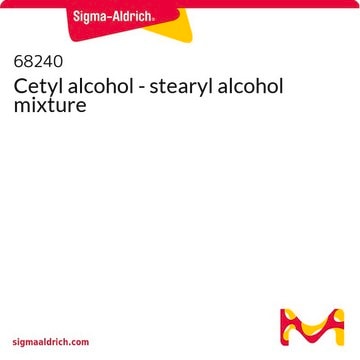PHR1133
Cetyl Alcohol
Pharmaceutical Secondary Standard; Certified Reference Material
Sinónimos:
1-Hexadecanol, Cetyl alcohol, Palmityl alcohol
About This Item
Productos recomendados
grade
certified reference material
pharmaceutical secondary standard
Quality Level
agency
traceable to Ph. Eur. C0990000
traceable to USP 1103003
vapor density
8.34 (vs air)
vapor pressure
<0.01 mmHg ( 43 °C)
API family
cetyl alcohol
CofA
current certificate can be downloaded
autoignition temp.
483 °F
expl. lim.
8 %
technique(s)
HPLC: suitable
gas chromatography (GC): suitable
bp
179-181 °C/10 mmHg (lit.)
mp
48-50 °C (lit.)
density
0.818 g/mL at 25 °C (lit.)
application(s)
cleaning products
cosmetics
food and beverages
personal care
pharmaceutical (small molecule)
format
neat
storage temp.
2-30°C
SMILES string
CCCCCCCCCCCCCCCCO
InChI
1S/C16H34O/c1-2-3-4-5-6-7-8-9-10-11-12-13-14-15-16-17/h17H,2-16H2,1H3
InChI key
BXWNKGSJHAJOGX-UHFFFAOYSA-N
¿Está buscando productos similares? Visita Guía de comparación de productos
General description
Application
Analysis Note
Other Notes
Footnote
related product
Storage Class
11 - Combustible Solids
wgk_germany
nwg
flash_point_f
338.0 °F
flash_point_c
170 °C
Elija entre una de las versiones más recientes:
¿Ya tiene este producto?
Encuentre la documentación para los productos que ha comprado recientemente en la Biblioteca de documentos.
Los clientes también vieron
Nuestro equipo de científicos tiene experiencia en todas las áreas de investigación: Ciencias de la vida, Ciencia de los materiales, Síntesis química, Cromatografía, Analítica y muchas otras.
Póngase en contacto con el Servicio técnico









